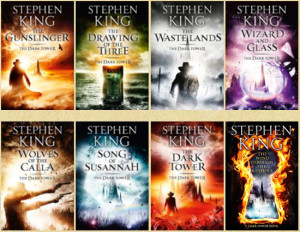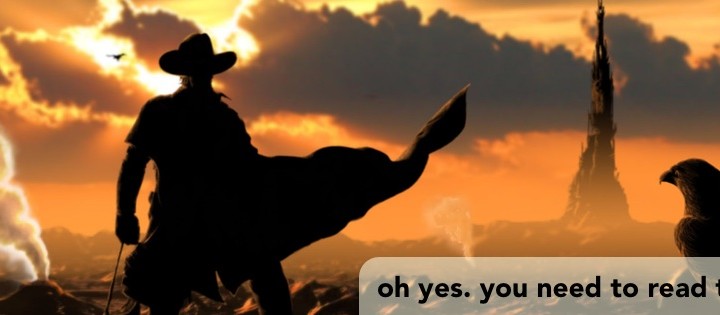What would you get, my friends, if you took JRR Tolkien’s Lord of the Rings saga, threw in a dash of Clint Eastwood, added a healthy helping of the tales of King Arthur, sprinkled some TS Eliot on top, and mixed the whole concoction together with a light saber?
There’s only one result of such a mixture: Stephen King’s Dark Tower series, the novels I’ve been reading for the past two months.
Wait, stop. Don’t quit reading at the words “Stephen King.”
Maybe you think you don’t like Stephen King.
“Oh, yuck. Blood-thirsty vampires, monsters who live in the sewers, rabid dogs. Redrum. No thanks, not into horror.”
Maybe, if you’re the kind of reader who reads the types of stories I like to write — young adult fantasy / sci-fi stuff, that is — you think Stephen King’s not your cup of tea. And okay, maybe his typical fare isn’t your thing.
But what if I showed you a beautiful passage like this one, a passage that has more to do with love, loss, and the slow and often painful progression of time, and far less to do with Cujo:
Roland looked up and saw Susan sitting in her window, a bright vision in the gray light of that fall morning. His heart leaped up and although he didn’t know it then, it was how he would remember her most clearly forever after — lovely Susan, the girl at the window. So do we pass the ghosts that haunt us later in our lives; they sit undramatically by the roadside like poor beggars, and we see them only from the corners of our eyes, if we see them at all. The idea that they have been waiting there for us rarely if ever crosses our minds. Yet they do wait, and when we have passed, they gather up their bundles of memory and fall behind, treading in our footsteps and catching up, little by little.
An Epic Quest Spanning Seven Books
Have I got your attention yet?
The seven books making up the Dark Tower series are what Stephen King himself has called his magnum opus, the novels that tie together his impressive, prolific body of work and reach for something bigger than anything else he’s ever written.
In case you’re not familiar with the Dark Tower series, here’s the basic gist:
Roland is the last gunslinger. And to understand what a “gunslinger” is, imagine a Jedi knight crossed with Sir Lancelot crossed with Aragorn from Lord of the Rings crossed with Clint Eastwood. Roland’s quest is the biggest you can imagine — he’s out to save the universe. Not just our universe, either, but all universes. The universes come together at the Dark Tower — the home of God, if you will — but something’s wrong at the tower. Roland will go to the tower, no matter what or who it costs him, and he will set things right. And if no one’s at home in the tower? If, as Nietzsche said, God is dead? Well, then, Roland will simply take over the tower himself.
Roland is Icarus — too ambitious and flying too close to the sun — but he’s also Obi Wan Kenobe, as in “Help us, Obi Wan. You’re our only hope.”
He is the only hope left to a dying world. He knows it. The world knows it. The forces of evil know it.
The only thing no one knows is whether or not he’ll be successful.
Roland’s journey takes him from his home in In-World, which is a sort of post-Apocalyptic Old West, to 1970s New York City, to (because it appears in every Stephen King novel) modern-day Maine. Along the way, he’ll help a heroin junkie kick his habit, help a heroine schizophrenic kick her extra personalities, and help a boy die and then be born again. He’ll battle monsters in the bowels of the earth that may as well have come out of a Dungeons & Dragons novel, and palaver — yes, I said palaver — with robots who may as well have come out of Asimov.
The rest of this post is me waxing on about how extraordinary this series is. If you want to stay around for that, which in all likelihood will end up as nothing more than a conversation with myself, then you are welcome to keep reading. If you’d prefer to stop here and just investigate the dang books for yourself over at Amazon, here’s the link to the first one in the series, titled The Gunslinger.
Literature is an ongoing conversation spanning centuries.
Okay, hang on, I’m about to get all English Major Geek on you. But before I do that, I want to say this:
Stephen King is the Lady Gaga of the written word. Or, probably more accurately, Lady Gaga is the Stephen King of music.
What do I mean by that? Well, here’s the thing: Most people see Lady Gaga as nothing more than pop musician. And on one level, that’s true — she makes mighty catchy dance tunes that get stuck in your head for days in a way that only pop music can.
But I would like to argue that Lady Gaga is an under-appreciated artist. If you’ve ever seen her film-like music videos, you’ll understand that Gaga is nearly avant-garde in her scope and ambition. Case-in-point:
And for all those who doubted that Gaga had true talent, she gave them a little taste of what she’s capable at the Oscars this year. Remember that? When she sang Julie Andrews at a calibre that even Julie Andrews had to raise her eyebrows at?
Stephen King is the same.
Some might dismiss him for being nothing more than a “genre writer,” a hack, the King of a kingdom of schlock. But the Dark Tower series is his Lady Gaga sings Julie Andrews moment, his definitive proof that his popularity doesn’t come just from appealing to the lowest common denominator fiction reader, but that he has real talent, real ability to masterfully weave together a tapestry of words as skillfully as any celebrated author of literary fiction, like Don DeLillo or John Updike.
Throughout the series, he weaves in allusions to poets like TS Eliot and Robert Browning, he echoes writers like JRR Tolkien and Isaac Asimov while remaining completely original, and he reengineers the hero’s quest from something that belongs to medieval literature to something that can only be called “postmodern.” The whole thing is a tour de force, King’s way of being a part of that literary conversation that dates back for centuries, but without any of the pretension that literary fiction writers manage to inevitably accomplish.
And the Ending — Ohhhh The Ending!
I just did a quick peruse around the Internet, and people have a range of theories and opinions on the final conclusion to the Dark Tower series. Some people love it, some people hate it; many are confused by it. Other people are welcome to their opinions, but as for me, I loved it. No — I more than loved it, I got goosebumps reading it. And I HATED it, which is another way of saying I LOVED it! I know that sounds schizophrenic, but you just have to read these books for yourself.

